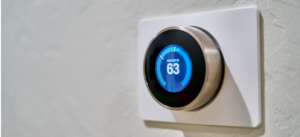How to make your home more energy efficient

With energy prices currently sky high, and a growing demand to live more sustainably, many of us want to make our homes more energy efficient. Doing so can result in money savings and being more environmentally friendly. It sounds like a win-win situation, so here are some tips to get started.
Arm yourself with data
Before you begin, it’s helpful to know how energy efficient your home is now.
Read your EPC
You can look up your home’s current energy efficiency on your Energy Performance Certificate (EPC) which you should have been supplied prior to moving into your home. If your house is in the A-C band, it’s already doing well. However, if your home is rated D-G, your EPC will highlight what you can do to improve your home. If your EPC has expired or you don’t have one, a new certificate will cost about £60 to £120.
Install a Smart Meter
Knowing how much it costs to run your home and its specific appliances gives you necessary information to cut down energy usage. For instance, a Smart Meter can tell you how much you save by turning down your thermostat by a degree. Many energy providers will now install a Smart Meter for free so do contact yours to see if they run such an initiative.
Find out if you’re eligible for ECO funding
The Energy Company Obligation means energy providers must evaluate how energy efficient low income and vulnerable households are. They must then implement measures to help those households become energy efficient. The Government hopes that it will cut £300 off energy bills and reduce carbon emissions.
Insulate, insulate, insulate
One of the main reasons houses are energy inefficient is through loss of heat. Insulation is one of the best ways to minimise that heat loss and cut down on how much gas you subsequently use to heat your home.
Insulation can be both a big and a small job. Bigger areas to insulate would be your loft and ground floor. Insulating any walls is a good option too, especially if your home is detached.
However, don’t forget small gaps that also let cold air into a home, like keyholes. Insulating your pipes and water tank is also beneficial. Plus, while not insulation as such, you can add reflective panels behind your radiators so any heat produced is directed back into your home – and not lost to the wall behind.
Install new windows and doors
Newer style windows and doors which employ the best insulating materials ensure minimal energy loss. Double or triple glazing your windows is very effective, but you could try secondary glazing if you find the installation bill too expensive.
Look to the future
Heat pumps or biomass boilers are new types of home heating systems coming to the market. They’re expensive but the Government runs the Boiler Upgrade Scheme which gives grants to those who are eligible. Or, while the technology develops, you could wait and improve your home’s energy efficiency in the meantime. If you do the basics now, you could potentially need a lesser, and cheaper, heat pump model in the future.
